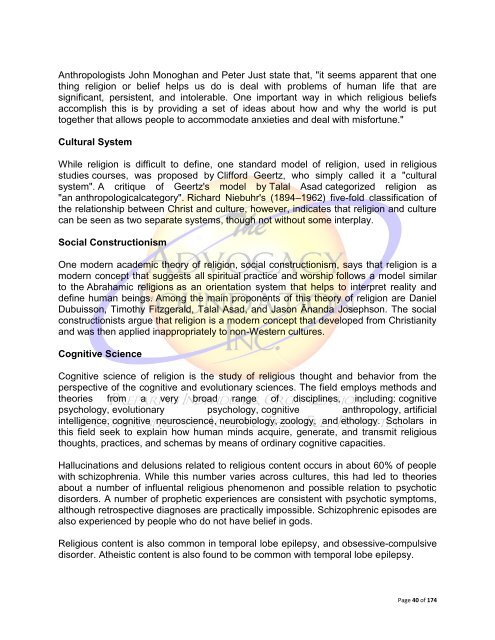The Gift of Spirituality
The Gift of Spirituality
The Gift of Spirituality
You also want an ePaper? Increase the reach of your titles
YUMPU automatically turns print PDFs into web optimized ePapers that Google loves.
Anthropologists John Monoghan and Peter Just state that, "it seems apparent that one<br />
thing religion or belief helps us do is deal with problems <strong>of</strong> human life that are<br />
significant, persistent, and intolerable. One important way in which religious beliefs<br />
accomplish this is by providing a set <strong>of</strong> ideas about how and why the world is put<br />
together that allows people to accommodate anxieties and deal with misfortune."<br />
Cultural System<br />
While religion is difficult to define, one standard model <strong>of</strong> religion, used in religious<br />
studies courses, was proposed by Clifford Geertz, who simply called it a "cultural<br />
system". A critique <strong>of</strong> Geertz's model by Talal Asad categorized religion as<br />
"an anthropologicalcategory". Richard Niebuhr's (1894–1962) five-fold classification <strong>of</strong><br />
the relationship between Christ and culture, however, indicates that religion and culture<br />
can be seen as two separate systems, though not without some interplay.<br />
Social Constructionism<br />
One modern academic theory <strong>of</strong> religion, social constructionism, says that religion is a<br />
modern concept that suggests all spiritual practice and worship follows a model similar<br />
to the Abrahamic religions as an orientation system that helps to interpret reality and<br />
define human beings. Among the main proponents <strong>of</strong> this theory <strong>of</strong> religion are Daniel<br />
Dubuisson, Timothy Fitzgerald, Talal Asad, and Jason Ānanda Josephson. <strong>The</strong> social<br />
constructionists argue that religion is a modern concept that developed from Christianity<br />
and was then applied inappropriately to non-Western cultures.<br />
Cognitive Science<br />
Cognitive science <strong>of</strong> religion is the study <strong>of</strong> religious thought and behavior from the<br />
perspective <strong>of</strong> the cognitive and evolutionary sciences. <strong>The</strong> field employs methods and<br />
theories from a very broad range <strong>of</strong> disciplines, including: cognitive<br />
psychology, evolutionary psychology, cognitive anthropology, artificial<br />
intelligence, cognitive neuroscience, neurobiology, zoology, and ethology. Scholars in<br />
this field seek to explain how human minds acquire, generate, and transmit religious<br />
thoughts, practices, and schemas by means <strong>of</strong> ordinary cognitive capacities.<br />
Hallucinations and delusions related to religious content occurs in about 60% <strong>of</strong> people<br />
with schizophrenia. While this number varies across cultures, this had led to theories<br />
about a number <strong>of</strong> influental religious phenomenon and possible relation to psychotic<br />
disorders. A number <strong>of</strong> prophetic experiences are consistent with psychotic symptoms,<br />
although retrospective diagnoses are practically impossible. Schizophrenic episodes are<br />
also experienced by people who do not have belief in gods.<br />
Religious content is also common in temporal lobe epilepsy, and obsessive-compulsive<br />
disorder. Atheistic content is also found to be common with temporal lobe epilepsy.<br />
Page 40 <strong>of</strong> 174

















